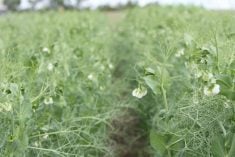The canola-based biodiesel industry may be over-hyped, according to the author of a study exploring the economics of various biodiesel feedstocks.
“There should be some caution in terms of the hype that is being laid out for biodiesel in terms of saving the western oilseed industry or solving the farm income problems,” said Al Mussell, senior research associate at the George Morris Centre.
“Because canola is not the least-cost feedstock and people may not want to use it and that will have some ramifications.”
But others in the industry say the quality of canola-based biodiesel is superior and the price difference can be mitigated by using damaged and green canola seed.
Read Also

Prairies have variable soil moisture conditions
The dry weather in the west was welcome for preserving grain quality and advancing harvest, but it has resulted in very dry soil moisture conditions.
Mussell’s study, to be presented in Calgary later this month at the Canola Council of Canada’s two-day biodiesel conference, compared canola oil to other biodiesel feedstock ingredients like palm oil, soybean oil, beef and pork tallow and yellow grease, which is the leftover grease from restaurant fryers.
The prices for all ingredients, including animal fats, are driven by the soybean oil complex. Canola trades at a premium to soy, while tallow and greases are sold at a significant discount.
Mussell said it is probable that canola oil will become increasingly more expensive relative to soy as it continues to be sold as a premium food product with a superior fatty acid profile.
He expects the price of rendered fats to keep losing ground to soy due to the continuing fallout from the BSE crisis. He cited the expanded ban on the use of specified risk materials as a case in point.
“It’s going to be real low-priced stuff and that will tend to pull that spread down.”
As a result of the price dynamics, he does not expect canola to be the first choice of refineries when they gear up to meet the federal government’s commitment for a national five percent biodiesel blend.
“Canola is by far and away not the cheapest feedstock from which to make biodiesel,” said Mussell.
But there are plenty of other considerations when making biodiesel, said Carl Perlinger, business development manager of Milligan Biotech Inc., a Foam Lake, Sask., firm that is in the process of expanding to become a four-to-five million litre a year plant.
“Canola does make the highest quality biodiesel,” he said.
Soy-based product does not meet the European standard for biodiesel, which is why the Americans were forced to adopt their own standard, said Perlinger.
He isn’t concerned about the high relative price of canola oil because biodiesel plants can produce the same quality fuel using green, heated, damaged and off-grade canola as they can with the best seed, which will keep prices in check.
Perlinger also pointed out that there will be 2.5 million tonnes of canola carryover heading into the 2006-07 crop year, which is a big enough surplus to keep prices down and biodiesel plants busy for a few years.
“It’s kind of a moot point for the short term,” he said.
Lorne Hepworth, president of CropLife Canada, said a lot of advancements have already been made that could make canola more price competitive, such as the higher yielding hybrid varieties.
He said increasing yield and oil content will be the main focus of future canola research and development efforts.
“What more can be done there I think will be the interesting part of the equation,” said Hepworth.















